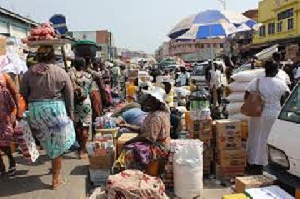A new report authored by Effective States and Inclusive Development (ESID), an international local research organization, has indicated that Ghana has experienced sustained growth without structural transformation.
It also said the agriculture sector has declined while the manufacturing sector has stagnated, adding that there has been growth in the services sector “but it is characterized by low productivity and wages.”
Launched in Accra yesterday, the report, themed: ‘The Challenge of State Effectiveness and the Promise of Inclusive Development in Ghana,’ said since 1983, Ghana has experienced sustained growth, recording annual average growth of 4.4 percent between 1983 and 1999.
“Growth then accelerated to an average of 6.5 percent per annum between 2000 and 2013.
“However, this has not been accompanied by transformation of the economy towards more productive activities,” it pointed out.
It further said although Ghana’s export basket has changed over the years, it is still dominated by primary products.
“In the 1960s, over 85 percent of all exports came from primary produce – cocoa (65 percent), crude minerals (11 percent) and timber (8 percent). In 2013, primary products still featured prominently in the export baskets such as gold (25 percent), petroleum (27 percent), cocoa (14 percent), cocoa butter and paste (4 percent). This suggests that despite changes in Ghana’s output composition, true structural transformation has yet to occur.”
Agriculture
It stated that although agriculture has in recent times contributed less than 30 percent to GDP, its employment share of 40 percent was the same as the services sector, which contributed approximately 50 percent to GDP in 2010.
“This means that the productive returns for labour in the agriculture sector are low compared with the services sector. Meanwhile, the share of employment in the manufacturing sector has stagnated at 15 percent. Moreover, labour from the declining agriculture sector has moved to those parts of the service sector that have relatively low productivity and wages.”
SMEs
It said most firms in Ghana are small and medium-sized enterprises, household businesses and small holder agriculture producing for the domestic market.
“There are few exporting manufacturing firms. However, due to the nature of the political settlement which leads to short-termism among political elites, neither domestically oriented nor exporting firms have long-standing predictable relationships with upper echelons of government.
“Relationships that do exist often only last until the next election, and as such are not conducive to long-term investment and productive growth.”
It said “although most firms in Ghana are small and medium-sized enterprises in the manufacturing sector, mining firms have closed relationships with the political elite and more power lies with them.”
It noted that “the relationship between the state and business remains closed to new firms, especially those in the manufacturing sector.”
The report pointed out that “the closed nature of the relationship between the state and business in Ghana has harmed innovation.”
Open deal environment
Meanwhile, two of the researchers, who made separate presentations at the launch of the report on Tuesday at CDD-Ghana Head Office, proposed that managers of Ghana’s economy should strive to move towards what they termed a more open deal environment to attract more investors into the country.
According to Augustine Fosu of ISSER and Prof. Robert Osei, the current “closed deal” regime in Ghana was posing serious challenges for business development and expansion.
Business News of Wednesday, 6 April 2016
Source: dailyguideafrica.com













